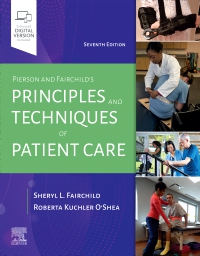
Pierson and Fairchild's Principles & Techniques of Patient Care, 7th Edition
Spiral Bound

Before students can master any role in physical therapy, they must first master the basics of patient care! Pierson and Fairchild's Principles & Techniques of Patient Care, 7th Edition provides a solid foundation in the knowledge and skills needed for effective patient care. Clear, step-by-step instructions show how to safely perform common procedures and tasks such as assessment of vital signs, positioning and draping, range of motion exercises, and patient transfer activities. Rationales make it easy to understand why specific techniques are used. Included free with each new print purchase is an enhanced eBook with video clips demonstrating procedures and techniques.
-
- NEW! Revised content provides the current information students need to be effective practitioners in physical therapy and occupational therapy, and includes input from clinical experts.
- NEW! Updated patient questions and documentation guidelines on wound care are included.
- NEW! Content on COVID-19 includes instructions on donning and doffing PPE, and is aligned with the latest CDC guidelines.
- NEW! Coverage of preventive patient positioning and objectively assessing patient pain is updated and expanded.
- NEW sections address early mobilization and exercise in the ICU.
- NEW! Enhanced eBook version – included with print purchase – allows students to access all of the text, figures, and references from the book on a variety of devices.
- NEW! Video clips are included in the eBook, demonstrating techniques and procedures.
- NEW! Educator resources on Evolve include an updated image collection, test bank, and PowerPoint® slides.
- Content based on the World Health Organization’s ICF model (International Classification of Functioning, Disability, and Health) — the model currently endorsed by the APTA and AOTA — ensures your students are learning the most current theories and practice guidelines of physical and occupational therapy.
- More than 800 full-color photographs illustrate the concepts and techniques used in the assessment and management of patients in the rehabilitation setting.
- Procedure boxes include clear guidelines for performing each step of patient care tasks such as proper lifting techniques, patient transfers, basic wound care, and assessment of vital signs.
- Insights into physiological principles and rationales explain why specific techniques and procedures are used.
- Guidelines, principles, and precautions boxes offer additional tips for optimal assessment and management of patients in the rehabilitation setting.
- Self-study and problem-solving activities include case studies at the end of each chapter to help students understand important concepts and practice decision-making and problem-solving skills.
- Coverage of professionalism, professional values, and ethics discusses workplace guidelines and describes how to apply those guidelines to patient interactions.
-
- NEW! Revised content provides the current information you need to be an effective practitioner in physical therapy and occupational therapy, and includes input from clinical experts.
- NEW! Content on COVID-19 includes instructions on donning and doffing PPE, and is aligned with the latest CDC guidelines.
- NEW! Updated patient questions and documentation guidelines on wound care are included.
- NEW! Coverage of preventive patient positioning and objectively assessing patient pain is updated and expanded.
- NEW sections address early mobilization and exercise in the ICU.
- NEW! Enhanced eBook version – included with print purchase – allows you to access all of the text, figures, and references from the book on a variety of devices.
- NEW! Video clips are included in the eBook, demonstrating techniques and procedures.
-
Preparation for Patient Care Activities
Approaches to Infection Control
Assessment of Vital Signs
Body Mechanics
Positioning and Draping
Basic Exercise: Passive and Active Range of Motion
Features and Activities of Wheelchairs
Transfer Activities
Assistive Devices, Patterns, and Activities
Special Equipment and Patient Care Environments
Basic Wound Care and Specialized Interventions
Incidents and Emergencies
Americans With Disabilities Act and Environmental Assessments
Bibliography
Appendixes
Procedures Index
Index
